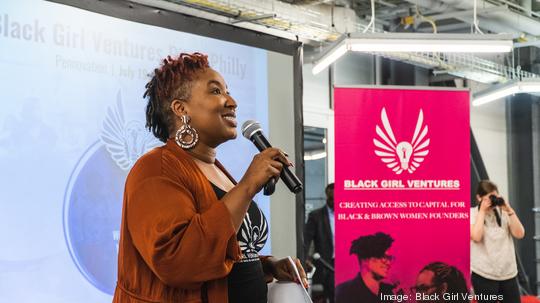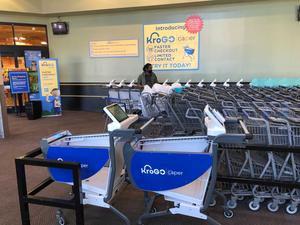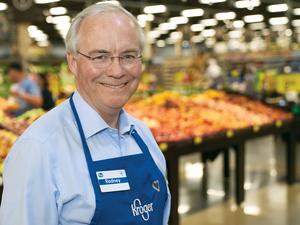
Kroger Co.’s foundation has invested $3 million from its new Racial Equity Fund to four organizations, including one that is launching a Cincinnati unit to help local minority women entrepreneurs.
The Kroger Co. Foundation, part of downtown Cincinnati-based Kroger (NYSE: KR), the nation’s largest operator of traditional supermarkets, awarded the grants through its Racial Equity Fund’s Build it Together grant challenge.
Washington, D.C.-based Black Girl Ventures, which received $500,000, will use some of that money to launch a Cincinnati unit. That will be the 13th city in which it operates.
The foundation invited 14 organization to apply for grants of up to $1 million each.
“Our objective is impact philanthropy,” Keith Dailey, Kroger’s group vice president of corporate affairs and president of the Kroger Co. Foundation, told me. “We’re looking to do the most good with our philanthropic dollars. Our goal is to advance racial equality in our culture and our communities.”
Kroger also awarded grants to:
- New York-based Local Initiatives Support Corp. (LISC), the nation’s largest community development organization, which received $500,000. It has offices in 36 cities, including Cincinnati. It plans to use the grant money to advance its Project 10X, which aims to close the racial health, wealth and opportunity gaps in America.
- Los Angeles-based Everytable, which received $1 million. It aims to make fresh, delicious food accessible to everyone everywhere through grab-and-go storefront markets in communities with extreme scarcity of healthy food options. It plans to use the money to open 40 franchises owned by people of color over the next two years.
- Washington, D.C.-based Thurgood Marshall College Fund. The nation’s largest organization exclusively representing the Black college community received $1 million. It plans to use the grant money to focus on food insecurity and food waste, particularly in low-income and underserved Black communities.
Shelly Bell founded Black Girl Ventures in 2016 as a way to help Black and Brown women entrepreneurs get access to capital, Bell, who is also CEO, told me.
The group has created a pitch program for entrepreneurs to pitch their company to an audience that invests in those companies, she said. It has completed more than 30 pitch programs in 12 cities, raising $600,000 in funding.
Now that program will come to Cincinnati. Black Girl Ventures, which also operates an incubator and accelerator, will provide a nine-month fellowship to work with minority women entrepreneurs on business ownership and leadership. It looks for entrepreneurs who have been in business for at least a year, are generating revenue and have annual revenue of less than $1 million.
The group, which is also launching a similar program in Detroit and later this year in Los Angeles, also operates an incubator and accelerator.
It wasn’t required to choose Cincinnati to launch a program as part of Kroger’s grant, Bell said. Black Girl Ventures has already been researching Cincinnati for expansion. It considers demographics, entrepreneurial activities and partnering opportunities, among others, in selecting cities. The group had been working with Cincinnati accelerator Mortar.
“When this opportunity came up it was exciting because Mortar and Kroger are there,” Bell said. “We chose Cincinnati.”
She wants to expand in Cincinnati well beyond the first cohort.
“We want to make this sustainable,” Bell said. “We don’t want to be a one-and-done.”
If Black Girl Ventures does generate a continuing operation here it will hire a local city director, Bell said.
She plans to work within the parameters of the existing startup community. She has talked to people at Mortar, Cincinnati startup catalyst Cintrifuse and others.
“We’ll honor the ecosystem that was there before,” she said.
It wasn’t easy for Kroger Foundation officials and others it enlisted to help weigh the applications, Dailey said. It initially planned to award three grants but ultimately decided to give money to four organizations.
“We started with the notion we don’t have all the answers but we want to be part of the solution,” Dailey said. “We were looking for opportunities to enhance wealth equity and address food insecurity and race equity. We wanted to drive resources to the organizations that could have the most impact. We want to be the spark that drives innovation.”
The foundation is operating the Racial Equity Fund with a $5 million donation from Kroger Co. that was used in part to fund the Build it Together grants. The fund won’t necessarily make a similar annual donation to other organizations, Dailey said.
“This is the inaugural cohort and we know there are dozens of other organizations doing high-impact things,” he said. “We’ll continue to look at ways we can participate with them. We have ambitions to use these funds in a targeted, hyperlocal way to drive equity in some of our markets.”
Kroger has nearly 2,800 stores in 35 states. Washington and Los Angeles are among its major markets.








